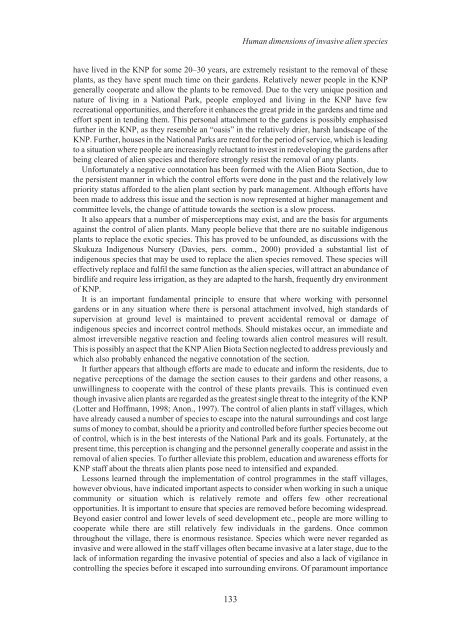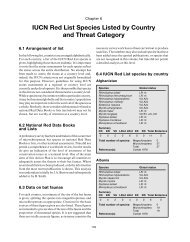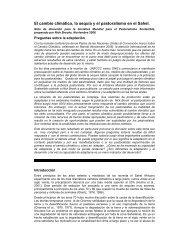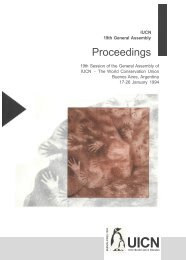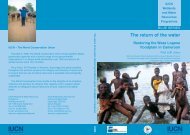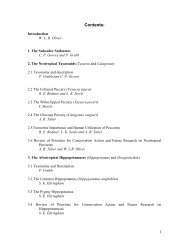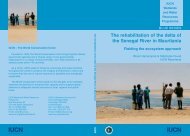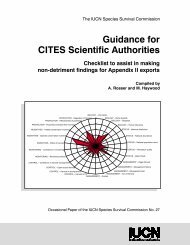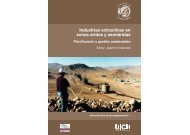Alien Species.vp - IUCN
Alien Species.vp - IUCN
Alien Species.vp - IUCN
Create successful ePaper yourself
Turn your PDF publications into a flip-book with our unique Google optimized e-Paper software.
have lived in the KNP for some 20–30 years, are extremely resistant to the removal of these<br />
plants, as they have spent much time on their gardens. Relatively newer people in the KNP<br />
generally cooperate and allow the plants to be removed. Due to the very unique position and<br />
nature of living in a National Park, people employed and living in the KNP have few<br />
recreational opportunities, and therefore it enhances the great pride in the gardens and time and<br />
effort spent in tending them. This personal attachment to the gardens is possibly emphasised<br />
further in the KNP, as they resemble an “oasis” in the relatively drier, harsh landscape of the<br />
KNP. Further, houses in the National Parks are rented for the period of service, which is leading<br />
to a situation where people are increasingly reluctant to invest in redeveloping the gardens after<br />
being cleared of alien species and therefore strongly resist the removal of any plants.<br />
Unfortunately a negative connotation has been formed with the <strong>Alien</strong> Biota Section, due to<br />
the persistent manner in which the control efforts were done in the past and the relatively low<br />
priority status afforded to the alien plant section by park management. Although efforts have<br />
been made to address this issue and the section is now represented at higher management and<br />
committee levels, the change of attitude towards the section is a slow process.<br />
It also appears that a number of misperceptions may exist, and are the basis for arguments<br />
against the control of alien plants. Many people believe that there are no suitable indigenous<br />
plants to replace the exotic species. This has proved to be unfounded, as discussions with the<br />
Skukuza Indigenous Nursery (Davies, pers. comm., 2000) provided a substantial list of<br />
indigenous species that may be used to replace the alien species removed. These species will<br />
effectively replace and fulfil the same function as the alien species, will attract an abundance of<br />
birdlife and require less irrigation, as they are adapted to the harsh, frequently dry environment<br />
of KNP.<br />
It is an important fundamental principle to ensure that where working with personnel<br />
gardens or in any situation where there is personal attachment involved, high standards of<br />
supervision at ground level is maintained to prevent accidental removal or damage of<br />
indigenous species and incorrect control methods. Should mistakes occur, an immediate and<br />
almost irreversible negative reaction and feeling towards alien control measures will result.<br />
This is possibly an aspect that the KNP <strong>Alien</strong> Biota Section neglected to address previously and<br />
which also probably enhanced the negative connotation of the section.<br />
It further appears that although efforts are made to educate and inform the residents, due to<br />
negative perceptions of the damage the section causes to their gardens and other reasons, a<br />
unwillingness to cooperate with the control of these plants prevails. This is continued even<br />
though invasive alien plants are regarded as the greatest single threat to the integrity of the KNP<br />
(Lotter and Hoffmann, 1998; Anon., 1997). The control of alien plants in staff villages, which<br />
have already caused a number of species to escape into the natural surroundings and cost large<br />
sums of money to combat, should be a priority and controlled before further species become out<br />
of control, which is in the best interests of the National Park and its goals. Fortunately, at the<br />
present time, this perception is changing and the personnel generally cooperate and assist in the<br />
removal of alien species. To further alleviate this problem, education and awareness efforts for<br />
KNP staff about the threats alien plants pose need to intensified and expanded.<br />
Lessons learned through the implementation of control programmes in the staff villages,<br />
however obvious, have indicated important aspects to consider when working in such a unique<br />
community or situation which is relatively remote and offers few other recreational<br />
opportunities. It is important to ensure that species are removed before becoming widespread.<br />
Beyond easier control and lower levels of seed development etc., people are more willing to<br />
cooperate while there are still relatively few individuals in the gardens. Once common<br />
throughout the village, there is enormous resistance. <strong>Species</strong> which were never regarded as<br />
invasive and were allowed in the staff villages often became invasive at a later stage, due to the<br />
lack of information regarding the invasive potential of species and also a lack of vigilance in<br />
controlling the species before it escaped into surrounding environs. Of paramount importance<br />
133<br />
Human dimensions of invasive alien species


